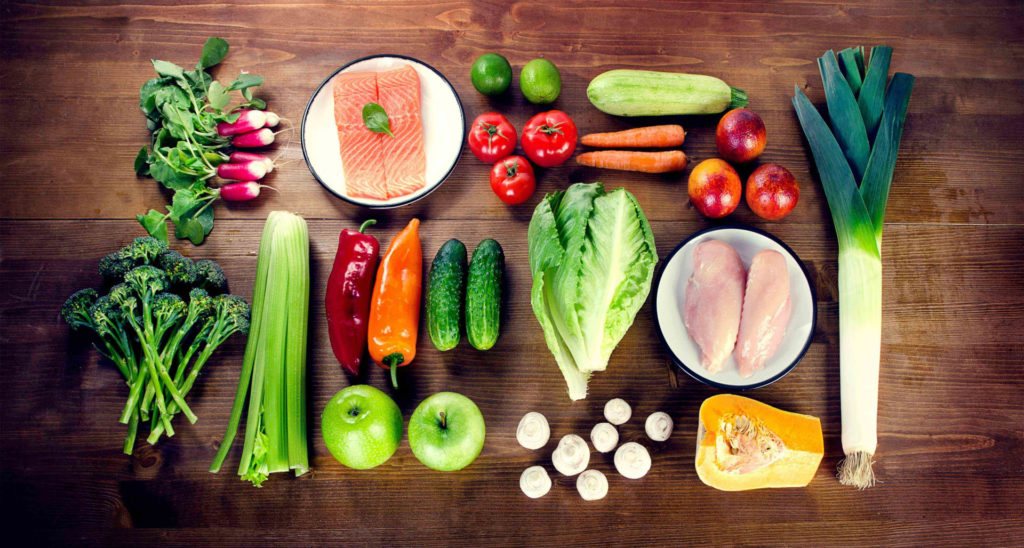Trying to figure out what to eat to maintain a healthy, balanced diet can seem overwhelming. There is a ton of information regarding what is and is not healthy to eat in addition to the various diets and food fads (in addition to all the diet reviews and other information available). To maintain a healthy diet, you need a variety of foods in moderation. Foods that contain fats, carbohydrates, and proteins are necessary for energy. Continue reading to learn more about carbohydrates, proteins, and fats, and why they are an important part of a healthy, balanced diet.
Carbohydrates
Carbohydrates can be either simple or complex and this is determined by the size of the molecule. Simple carbohydrates are small molecules and include various forms of sugar such as sucrose and glucose, according to Advances in Nutrition.
Complex carbohydrates are basically long strings of simple carbohydrates. Complex carbohydrates are larger molecules and therefore must be broken down into simple carbohydrates before they can be absorbed by the body. As a result of the slower absorption time, complex carbohydrates are slower to provide energy to the body and because they are digested slower, they are less likely to be converted to fat.
Complex carbohydrates include fibers, starches, other grains, root vegetables, and beans. Carbohydrates can be either refined or unrefined. Food that is highly processed is considered refined, and refined carbohydrates provide little nutritional value.
Proteins
Proteins consist of amino acid units that are strung together in complex formations and as such the body takes longer to break them down, meaning that proteins are a slower but longer lasting source of energy than carbohydrates, according to the U.S. National Library of Medicine.
There are twenty different amino acids with nine of them being considered essential amino acids which should be consumed as part of a healthy diet. Adults need eight of these essential amino acids while infants also need the ninth. The essential amino acids are leucine, isoleucine, methionine, lysine, phenylalanine, tryptophan, threonine, valine, and the ninth one, histidine.
Protein is necessary for the body to replace and maintain tissues and also for proper function and growth. The body contains a large amount of protein, it is the main building block of the body and enough needs to be consumed each day to maintain a healthy diet. Foods containing proteins include eggs, and meat, among other foods.
Fats
Fats are considered complex molecules and are composed of glycerol and fatty acids. Fats are necessary for proper growth and energy. Fats are the most energy efficient form of food but are also the slowest source of energy.
Due to the fact that fats are such an efficient form of energy, the body actually stores excess energy as fat. This can be unhealthy and as such, fats must be consumed in moderation to maintain a healthy diet. There are however different types of fats with some being healthier than others, according to the United States Department of Agriculture.
The different types of fat include monounsaturated, polyunsaturated, and saturated. There are also trans fats which are man made facts produced by adding hydrogen atoms to polyunsaturated or monounsaturated fatty acids. Of all the fats, trans fats are considered the unhealthiest and it is recommended that they be eliminated from diets whenever possible.
In addition to fats, proteins, and carbohydrates there are other ingredients that should be considered when planning a healthy meal or diet. Balancing the amount of fats, proteins, sugars, and carbohydrates will lead to a healthy diet and in turn better health all around.
What Users Are Saying
“I heard that it is a balanced meal if carbs, proteins and fats and it helped me a lot to not overdo it in one section. Be sure to get lots of veggies and fruits as well but don’t restrict yourself. I keep a bag of fun sized candy to eat one a day to keep myself sane.”
“It can be tough. “Health” food is generally expensive. Healthy food, on the other hand, is usually affordable, but it takes time, planning and knowledge to prepare. It’s also easy to get bogged down by all the information out there telling you that you have to do or eat or completely avoid whatever food they’re recommending or demonizing. No food is all-or-nothing. Remember that a lot of healthy eating is about slow improvement and learning over time. Learning to cook, learning to shop effectively, figuring out the best way to store food so it doesn’t go bad, and teaching yourself to enjoy healthier foods are all skills that take time and practice. So think of it as a process, not a program.”
“It depends on your needs/goals. What’s “healthy” for a person with no issues isn’t necessarily going to be healthy if you’re a diabetic or trying to lose weight. Generally you can’t go wrong with lean meats and veggies but we don’t know what you’re working with.”
More Information on Healthy Diets:
- An Overview of Carbohydrates, Proteins, and Fats for Consumers
- Daily Food Plans and Worksheets For a Healthy Diet
- Healthy Lifestyle: Healthy Eating for a Healthy Weight
- Eating Healthier and Feeling Better Using the Nutrition Facts Label
- Dietary Guidelines for Americans
A Balanced Diet: Carbs, Protein, & Fats Questions & Answers
Nutrients are essential for our bodies to function optimally. The seven essential nutrients needed for a balanced diet include: Carbohydrates, Fats, Proteins, Vitamins, Minerals, Water, Fiber
Article Sources
- https://www.ncbi.nlm.nih.gov/pmc/articles/PMC4224210/
- https://ghr.nlm.nih.gov/primer/howgeneswork/protein
- http://dining.illinoisstate.edu/menus/healthy/
- http://www.open.edu/openlearn/science-maths-technology/science/biology/nutrition-proteins/content-section-0
- https://edis.ifas.ufl.edu/he695
- http://dtc.ucsf.edu/living-with-diabetes/diet-and-nutrition/understanding-fats-oils/good-fats-bad-fats/
- https://www.reddit.com/r/AskMen/comments/bg7yqj/what_does_a_healthy_balanced_diet_look_like/eljvm15/
- https://www.reddit.com/r/internetparents/comments/aizus5/how_do_you_eat_a_balanced_and_complete_diet/eernobp/
- https://www.reddit.com/r/AskMen/comments/bg7yqj/what_does_a_healthy_balanced_diet_look_like/eljdxt1/
- http://www.merckmanuals.com/home/disorders-of-nutrition/overview-of-nutrition/carbohydrates,-proteins,-and-fats
- http://www.choosemyplate.gov/tools-daily-food-plans
- http://www.cdc.gov/healthyweight/healthy_eating/
- http://www.fda.gov/Food/IngredientsPackagingLabeling/LabelingNutrition/ucm274593.htm
- http://www.cnpp.usda.gov/DietaryGuidelines
Partner with Us!
Looking to promote your weight-loss products or services?
Our platform reaches a dedicated audience actively seeking the best solutions. Contact us to explore advertising opportunities and grow your brand with us.
Get in Touch
